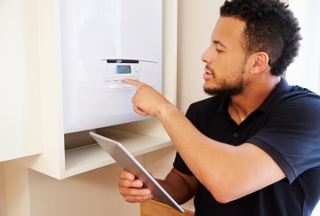A guide to landlord boiler cover and insurance
23 July 2020

As a landlord, it is very important to make sure that all boilers and central heating systems in your properties are working efficiently and effectively. There are many ways to ensure that your properties are being heated correctly, and it is never too early to start thinking about landlord boiler insurance to protect yourself and your tenants. In our guide, we talk about the importance of landlord boiler cover and insurance for your property.
The importance of having landlord boiler cover
Landlord insurance is important, especially if you’re reliant upon rent from your property and you want to avoid being saddled with pricey bills for repairs. There are other factors to consider too, like being liable if a tenant injures themselves on your property or possible damage caused to your property by a house fire or flooding. Having landlord boiler cover can give you access to a helpline and, in some cases, allow you to make unlimited call outs to engineers for regular checks and emergencies.
The advantages of landlord boiler insurance
Landlord insurance provides protection to you as a property owner against any potential financial losses received in conjunction to the property you are renting out. It also protects the building itself and covers risks like injury or loss suffered by a tenant because of any faults with the property.
As a landlord, the crucial advantage is to have landlord insurance to protect yourself and your tenants against damage and accidents. Most landlord insurance plans include boiler cover and replacement insurance which can help to save money in the long run. Your rental property is a major investment, so it’s important that you consider protecting it with suitable landlord insurance. A standard home cover plan may not offer the boiler cover you need for your property.
Boiler insurance can help you cover the cost of replacing or fixing your boiler when it breaks down. It can also be added to your landlord insurance plan or there’s the option of having boiler cover as a separate cover. Your boiler insurance includes a gas safety inspection and an annual boiler service which you are legally required to have every year.
Landlord Boiler Certificate
To ensure the safety of your tenants, all gas appliances and flues must undergo an annual gas safety check by a Gas Safe registered engineer. After this has been carried out and your appliances are deemed safe, you’ll be given a Landlord Gas Safety Record or Gas Safety certificate with details of all the checks that were carried out. This is otherwise referred to as a CP12 certificate.Gas safety checks can be arranged to be carried out any time from 10-12 months after the last check, without affecting the original check expiry date.
Boiler Service
There are many ways you can make sure that your boiler is working as it should. The first step in boiler maintenance is knowing what type of boiler you have in your property, there is a handy guide for this. Other recommended processes include making sure tenants keep their boilers active throughout the year (especially during winter), checking that the boiler flame is blue and also bleeding your radiators a few times a year.
Landlord Insurance Policy
An insurance policy is a contract between the insurer and the insured, known as the policyholder, which determines the claims which the insurer is legally required to pay. In the case of landlords, it is also important to have landlord liability insurance - a type of public liability insurance which protects Landlords from claims of compensation made by a third party, whether that be a tenant, visitor or tradesperson. This is regularly included in many landlord insurance policies.
For example, if a tenant is injured, or has their property damaged, and decides to blame you and your property, landlord liability insurance will enable you to pay any legal fees and compensation (medical fees or lost income etc.) up to the limit of your agreed policy.
Accidents can happen and often the smallest thing can cause a big issue like a loose carpet or faulty plug socket, so it is highly recommended to ensure you have liability insurance in place.